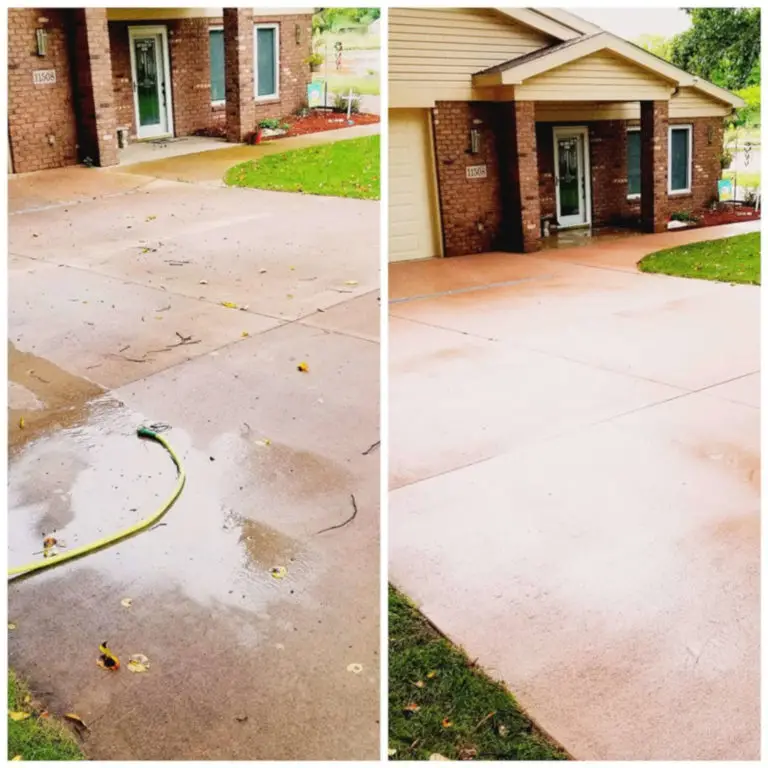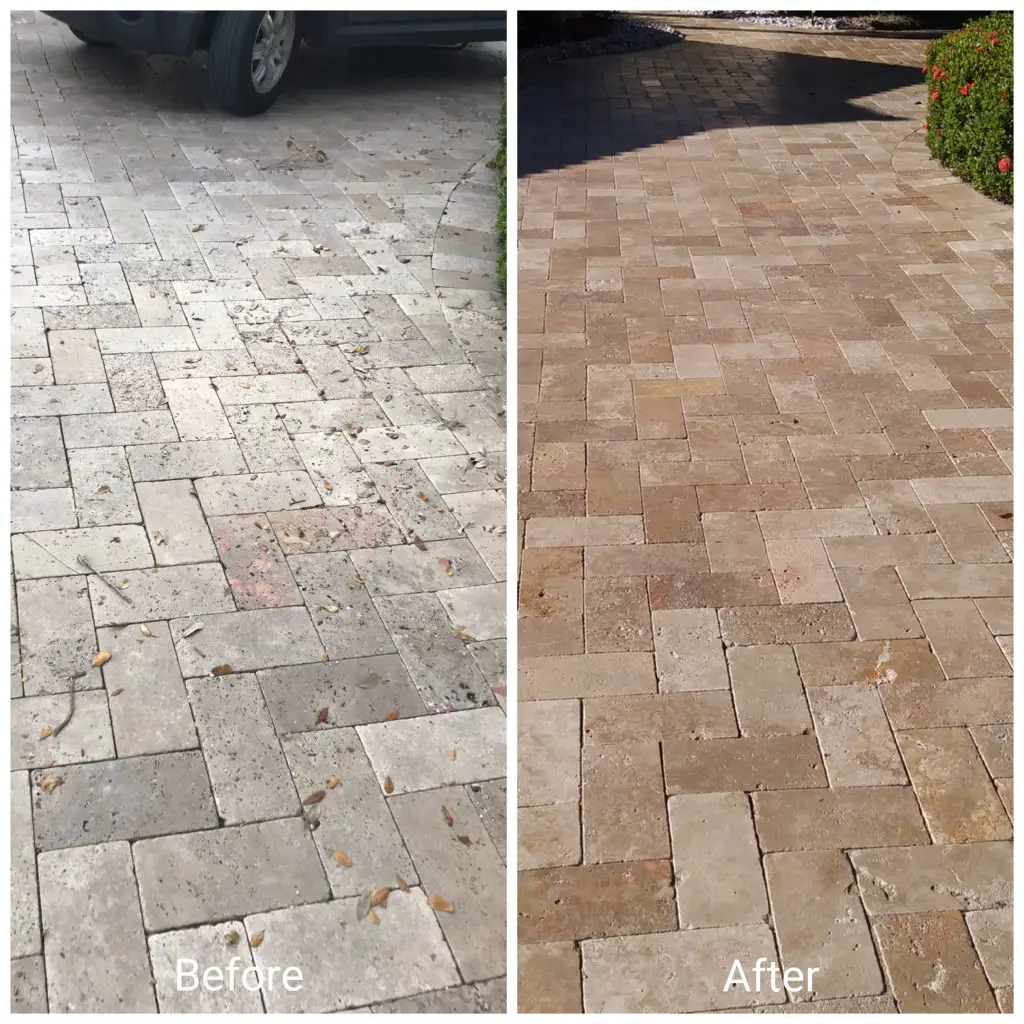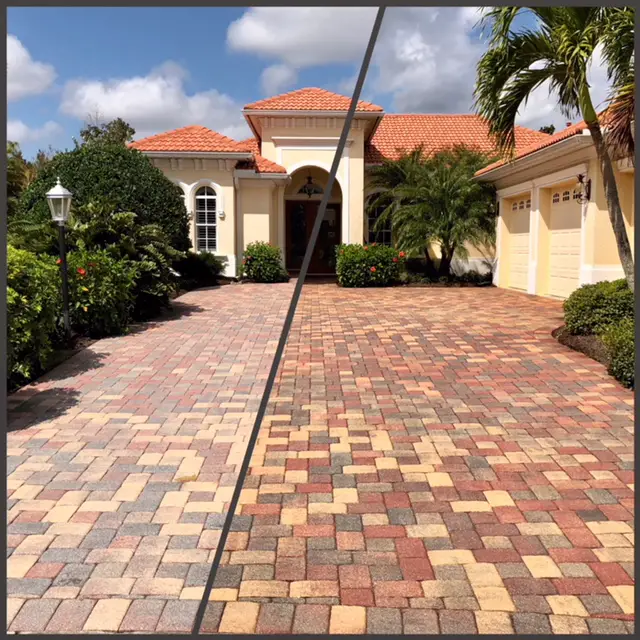Use Vinegar Or Bleach
If the mold insists on staying put after you pressure washed it, you can use a vinegar solution or bleach to remove the rest of it.
If you chose vinegar, make a mixture of 50/50 of vinegar and hot water and put it in a spray bottle, then spray it over all the area and wait for 5 to 10 minutes. After that time, srub a little more with a stiff brush and rinse the area. Remember to be careful with vinegar spills, they can burn your skin.
If vinegar doesnt work, you can also try using bleach, by mixing about a cup of it for each gallon of water. Put the mix in a spray bottle and spray all over the area, then wait for 5 minutes to rinse the area.
Should You Prep The Pavers Before Applying A Sealer
Even new pavers should be cleaned prior to sealing. Not only will it clean the pavers surface, but it will clean out the paver pores which allows for better sealer penetration.
Any efflorescence that has accumulated should be cleaned off the pavers before you seal them. Stains should also be removed prior to applying a sealer or else youll lock them in.
Brush off any dirt, pollen, dust etc. off the pavers. Make sure not to disturb the paver joint aggregate. If theres sand on the pavers it will be locked in place by the sealer.
Does Paver Sealing Prevent Weeds Moss And Algae
Does paver sealing prevent weeds, moss, and algae? That is a great question! We would like to be clear about our services and ensure you that we wish to provide you with the best information possible regarding your pavers.
The sealant includes a polymer additive that soaks into the sand between the pavers turning the sand hard similar to a mortar. This creates an environment that makes it extremely difficult for weeds to germinate and grow.
Our goal is to minimally prevent 90% of future weed growth. However, there can always be certain circumstances that can alter the efficiency of the sealed pavers. There are also a few things that can be done after your pavers are sealed to allow for maximum weed and vegetation prevention in the future. We feel that it is important for you to understand that our process and service is not a remedy for poorly installed pavers .
The number one reason weeds, moss, and algae grow between the pavers is due to inadequate or faulty paver drainage mechanisms and/or little to no sun exposure. The inadequate drainage can be caused by low or sunken areas, pavers that were improperly sloped during installation, patios that have stone walls around the perimeter , or even mounded landscape beds that also prevent effective water drainage.
How can I minimize the risk of future weeds, moss, and algae growth within my paver joints? Utilizing the following steps, you can have long term success with your sealed pavers.
You May Like: How Much Does Mold Removal Cost
The Best Cleaning Agent For Travertine Pavers
It is advisable to use a light soap or detergent to clean natural stone. Many companies push for you to use bleach and ammonia, but these harsh acidic chemicals can damage your travertine after a time.
Natural stone should be cleaned with a light soap or detergent. Many firms advocate for you to use bleach and ammonia, but these strong acidic chemicals might damage your travertine after a time.
How To Remove Mold From Travertine Pavers

Mold is another sort of filth commonly found in travertine pavers. Because travertine pavers are so commonly used as a pool surround, they are always going to be vulnerable to moisture damage. Even if your travertine pavers arent right next to a pool, they may still be lacking in sunlight. Mold can grow on pavers if there is a long period of time where there is a high level of dampness.
Following these steps is the best way to remove mold from your home:
It is necessary to perform this procedure on a regular basis in places where mold growth is more commonplace. Mold stains can be removed from travertine pavers with this method, even though it is more time-consuming and complicated.
Recommended Reading: How To Test For Mold In Your Body
Can You Pressure Wash Sealed Pavers
Pressure washing concrete pavers, especially newer ones, can easily damage the surface finish and we strongly suggest not pressure washing unless you are highly experienced and have the right equipment to pressure wash pavers. In most cases, to get pavers clean with a pressure washer it requires using a jet style tip…. continue reading
How To Clean Black Mold From Pavers
Mold can appear everywhere, from fruits to pavers. They are probably every homeowners nightmare and not only causes aesthetic problems but also health issues, once it can cause a variety of symptoms, like shortness of breath, aggravated asthma, sinus congestion, coughing, itchy eyes, allergies, etc.
If you have black mold growing on your pavers the best thing can do is give them a good cleaning to remove the mold and make sure it stays away from them for a long time.
In this article, youre gonna learn everything you need about cleaning and removing black mold from pavers properly and safely in a step-by-step guide!
Jump to
Also Check: How Much Does It Cost To Remove Mold
What Can Mold Resistant Coating Products Do For My Pavers
- ceramic tile sealer, concrete floor coating systems, durable floor sealing products, high quality floor cleaning products, high quality floor coating products, high quality floor sealing products, odorless floor sealing products, oil and stain resistant sealer, paver sealer, stain resistant sealing products, waterproof concrete sealer
Pavers are common outdoors and all around businesses. This affordable flooring option offers durability with great pricing. But the structure of brick pavers, concrete and natural stone leaves these surfaces susceptible to mold and mildew development. Removing mold from these surfaces can be tedious, and its much easier to keep these surfaces free of mold in the first place. At CoverTec Products, we have mold resistant coating products that can help protect these surfaces.
Can You Use Bleach On Outdoor Travertine Pavers
We dont recommend using bleach or ammonia to clean travertine pavers, even though this is commonly recommended by companies. Bleach and ammonia, like other chemicals, have acidic qualities that can harm surfaces over time. It is normal for travertine pavers to show signs of wear since their look begins to deteriorate. Travertine pavers might be damaged by certain cleaning solutions, notwithstanding their effectiveness.
For the most part, any chemical agent not specifically designed for cleaning travertine pavers should be avoided. The vinegar and citrus-based ingredients, such as lemons, are also included in this guideline. Always dilute any of these compounds, especially ammonia or bleach, with water before using them.
Recommended Reading: How To Treat Mold Allergy
Tell Me More About Paver Sealing
You need to wait at least 60 days after your new pavers are installed before having them sealed. Paver installers may try to talk you into sealing right away, but do not listen! Its imperative to allow time for efflorescence to present itself. The efflorescence looks like a cloudy film and its caused by the salts inside of the brick. As they come in contact with water, salt will surface.
If you seal your pavers before the salts come to the surface, it will trap the unsightly white fog under the sealer. In order to repair this staining, youll need to strip everything away and start from scratch again.
After your first wash and seal application, you will need to have your pavers sealed every 2 to 3 years to keep them continuously protected.
How Does Vinegar Remove Moss From Pavers
Spraying with a vinegar solution is an effective way to eliminate moss on pavers without damaging nearby plants and grasses. Mix one part water with three parts vinegar, and spray the mixture directly on your pavers. This will help kill any moss growing on them as well as prevent new growth for up to a month…. see more
Read Also: How To Get Rid Of Yellow Mold
Why Should You Seal Your Pavers
Brick pavers should be sealed for many reasons. There are many reasons people choose to seal their pavers but here the top 4 reasons.
How Long Should Pavers Dry Before Sealing

The pavers should be completely dry before a sealer is applied. This is very important. Make sure not to seal over wet pavers because the moisture will be locked in.
The amount of time you should wait depends on your climate and the weather. In warm, sunny climates, pavers will typically be dry and ready to seal in just a few hours. But in cooler climates or shady areas, its best to wait about 24 hours.
Also Check: When Is Mold Remediation Required
Is Sealing Concrete Pavers Necessary
Sealing pavers isnt necessary or required. However, its highly recommended that you seal exterior concrete surfaces. Especially surfaces that get wet or a lot of sun like flat work. The sealer will preserve and enhance your concrete pavers color as well as protect them from sun and water damage.
Once the concrete pavers have been installed and any grout is in place, most manufacturers recommend waiting about a year before applying sealer. This allows for some efflorescence to escape from the pavers before sealing them.Efflorescence is the white chalky substance that comes out of many brick or masonry products like concrete. Its basically salts and other minerals working there way out of the paver. When you see it happening just wash it right off with soap and water or use a paver cleaner.
If you seal the paver too soon then youll lock in those salts and minerals instead of allowing them to bleed out like they want to. There are some sealers that dont require a waiting period, so if you dont want to wait, make sure and buy the right type of sealer.
Some paver warranties require a sealer be applied at a certain point and periodically thereafter. Generally this is required once a year. Make sure to read your warranty if you buy a brand name paver that comes with one. Typically the warranty will cover excessive color fading and paver damage. If this occurs youll want to be covered.
Does Sealing Pavers Prevent Weeds And Mold
Just like any other surface in an outside environment, pavers are also susceptible to damages and wear like sun fading, erosion, staining, etc.
You probably know those things wont be a problem as long as your pavers are properly sealed. But does sealing pavers prevent weeds and mold too?
Yes, it does! And we will tell you exactly why.
Jump to:
You May Like: How Can Mold And Mildew Affect Your Health
Benefits Of Using Water
Acrylics and polyurethanes are the most common ingredients found in water-based paver sealers and are most common film forming sealers although penetrating sealers are available but most penetrating sealers do not provide a wet look. Acrylics are generally a single component and provide a durable coating with either a matte or gloss finish and provide a wet look.
This type of sealant is easy to apply with a sprayer, roller or brush and is safe for both new and old pavers. It is also non-flammable and will not harm plants, pets, or people. Water based paver sealers are generally low VOC& rsquor s, are environmentally friendly and available in all 50 states.
Polyurethane paver sealers are generally two component sealers and provide the most durability. They are available in both gloss and matte finishes, with gloss being the most +common and will provide a wet look once sealed if desired. Polyurethane based paver sealers will darken the pavers and provide a wet look. This type of sealer is also easy to apply, but special care must be taken when mixing the two components together prior to application.
A water based paver sealer is the best option for sealing concrete pavers and provides the following benefits as it will bind the sand joints providing joint stabilization, protection of the paver surface, resist stains, provide UV protection against fading and will inhibit weeds, weed growth, and ant mines.
Brick Paver Sealing Prevent Weeds & Mold Growth
Brick paver sealing is the process of color enhancing, protecting your brick pavers from being faded from the sun, preventing mold and weeds and stabilizing sand joints. By applying water based sealing products we are able to give your pavers a natural sheen finish known as the wet look. Red Hot Services technicians are trained and certified at our distributor Ure-Seal. Ure-Seal has proven to stand up to the toughest weather elements and can last twice as long as other water based sealing products. Red Hot Services has the ability to seal multiple products such as brick pavers, travertine, and concrete. Contact us today for your free no obligation estimate.
Don’t Miss: What Kills Mold On Vinyl Siding
Day 2 Paver Sealing Process
- Brush in dry silica sand into joints 1/8 inch below the bevel this process is called dry sanding.
- Apply a heavy flood coat of highly concentrated sealer to decrease the porosity of the the pavers.
- Apply another highly concentrated coat of sealer to create a color enhancement and lock your sand joints
- Apply the third coat of highly concentrated sealer to give a natural sheen and diamond sparkle
- Lastly our technicians will put up caution tape to prevent foot and vehicle traffic
How To Keep Mold And Mildew Off Your Pavers
There are quite a few ways to keep mold at bay when it comes to your concrete or stone patio pavers. If youve noticed any black or green looking stains on their surface, you likely have a mold problem. If not, you might currently be in the clear.
Regardless of if you have mold or not, weve rounded up some of our best tips for preventing and removing mold from pavers.
Read Also: How To Use Bleach To Kill Mold
Sealing Pavers Inhibits Weeds Growth Grass And Other Plants
In tropical weather conditions, weeds or grass normally grow rapidly. Sealed pavers will prevent the growth of weeds, fungi, and molds by limiting their affinity to getting the water that aids in their development. The sealing process also makes pavers less permeable to mold, growing at a very low rate.
Is There A Prep Process Before Applying Paver Sealant

Even new pavers should be cleaned with Techniseal® Paver Prep prior to sealing. Not only will it clean the pavers, but it will open the pores on the surface to allow better penetration of the sealant. Older pavers will also benefit, as Paver Prep will remove any efflorescence that has accumulated. Any stains should be removed prior to applying Paver Prep, using the specific stain remover for the type of stain. For more information, read last weeks blog on paver stain removal.
Also Check: Can Mold Cause Blood Clots
Benefits Of Restoring And Sealing Pavers
- Inhibits weeds and grass in joints
- Reduces moss growth
- Deters ants and other insects
- Prevents loss of sand in joints
- Helps repel oil, grease, grime and stains
- Easier routine cleaning
- Enhances color, texture and brightness
- Resists the effects of harsh weather conditions
- Provides protection from salt damage
- Reduces surface deterioration and wear
- Presents pavers from shifting
- Assures long lasting beauty and value
Advantages Of Regular Paver Cleaning And Sealing
If youve been putting of professional power washing for your propertys exterior surfaces, and especially needed cleaning of patio stones and brick, you might note some advantages of this work. You can then schedule it as needed with a pressure washing company near you, and know your home is protected and looking its best.
Recommended Reading: How To Remove Black Mold From Bathtub Caulk
How Do I Get Rid Of Moss On My Patio Naturally
Sprinkle Baking Soda To use baking soda to remove the moss from your paving stone driveway, walkway or patio, sprinkle it generously over the moss. Leave it overnight, and then use a push broom or deck brush to first remove the baking soda, and then to scrub the area to remove the moss…. view details
Is It Worth It To Seal Pavers
It depends on the pavers. If they are made of concrete, then sealing is great at protecting them from staining and fading. If they are made of natural stone, then sealing will help in protecting the surface and blocks from dirt, weathering, UV rays, and staining, but it won& rsquor t necessarily make them look better. In fact, if the sealer is applied too thick, it can actually make the stones or blocks look darker and mossier.
If you have a pavers blocks patio, driveway, or walkway, it& rsquor s important to seal them regularly. Sealing your concrete pavers is great for protecting them from dirt and staining, weathering, erosion, UV rays damage, and frost damage. It will also help keep them looking new for years to come.
You May Like: What Causes Mold To Form
